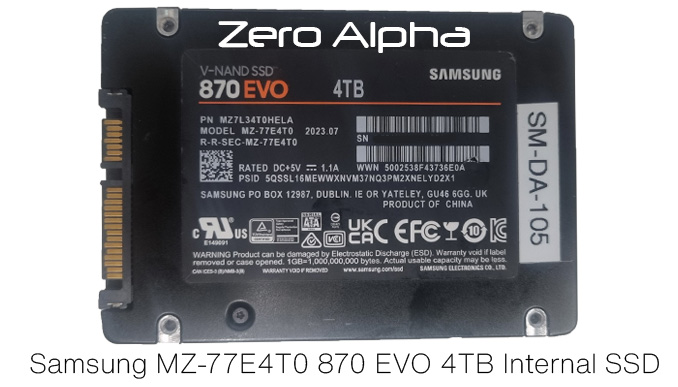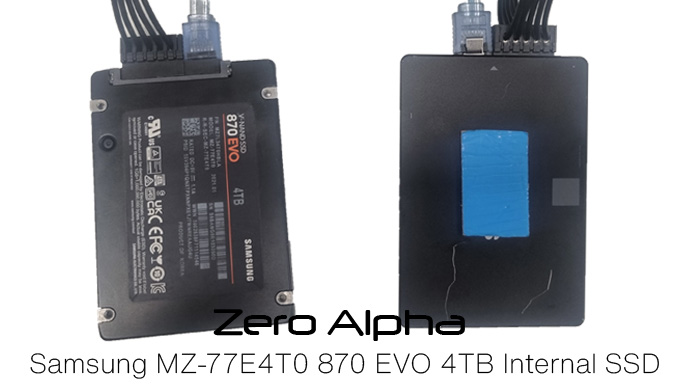Samsung MZ-77E4T0 870 EVO 4TB Internal SSD Data Recovery
The Samsung MZ-77E4T0 870 EVO 4TB Internal SSD, while known for its high performance and reliability, can encounter several common issues. Compatibility problems may arise with older systems that do not support the SATA III interface or the large 4TB capacity, leading to reduced speeds or the SSD not being recognized. Firmware bugs can cause instability or performance issues, necessitating updates to resolve slowdowns or data corruption. Over time, continuous write operations can lead to performance degradation, with users noticing slower write speeds and increased latency. Overheating under heavy workloads can result in thermal throttling or, in extreme cases, drive failure. Unexpected power losses or improper shutdowns pose risks of data loss, as the SSD lacks robust power loss protection. Despite a high endurance rating, intensive write workloads can wear out NAND cells over time, reducing the SSD's lifespan. Issues with the TRIM command can lead to slower performance and inefficient data management. Additionally, data migration problems during transfers and potential issues with firmware updates can cause drive instability or make the SSD unusable if not done correctly.

Common Issues
The Samsung MZ-77E4T0 870 EVO 4TB Internal SSD is a high-performance storage solution, but like all hardware, it can encounter certain issues. Here are some common problems users might experience:
-
Compatibility Issues:
- Cause: Not all systems, especially older ones, support the SATA III interface or the large 4TB capacity.
- Effect: The SSD might not be recognized by the system, or it may operate at reduced speeds if the system only supports SATA II.
-
Firmware Bugs:
- Cause: Bugs in the SSD’s firmware can cause instability or performance issues.
- Effect: Users might experience slowdowns, data corruption, or the drive not being recognized. Firmware updates are often needed to resolve these issues.
-
Performance Degradation Over Time:
- Cause: Continuous write operations and the nature of NAND flash memory can lead to performance degradation.
- Effect: Users might notice slower write speeds and increased latency after prolonged use.
-
Overheating:
- Cause: Extended use, especially under heavy workloads, can cause the SSD to heat up.
- Effect: Thermal throttling might occur, reducing performance to prevent damage, or in extreme cases, the SSD might fail.
-
Power Loss Protection:
- Cause: Unexpected power outages or improper shutdowns.
- Effect: Potential data loss or corruption, as consumer-grade SSDs like the 870 EVO do not have robust power loss protection compared to enterprise-grade models.
-
Sudden Failure:
- Cause: Manufacturing defects or electronic failures.
- Effect: The SSD might suddenly stop working, leading to potential data loss and the need for replacement.
-
Wear Leveling and Endurance:
- Cause: Despite having a high endurance rating, intensive write workloads can wear out the NAND cells over time.
- Effect: Reduced lifespan and eventual failure if the drive’s endurance is exceeded.
-
TRIM Command Issues:
- Cause: Some operating systems or configurations may not properly support the TRIM command.
- Effect: Without TRIM, the SSD might experience slower performance and reduced lifespan due to inefficient data management.
-
Data Migration Problems:
- Cause: Cloning software or migration tools might not always work seamlessly.
- Effect: Users may encounter issues when transferring data from an old drive to the new SSD, such as incomplete data transfer or boot problems.
-
Firmware Updates:
- Cause: Updating firmware can sometimes be problematic if not done correctly.
- Effect: Failed updates can lead to drive instability or even render the SSD unusable
Unallocated SSD formatted for Linux Caselog
02Aug24: A customer came in with this Samsung SSD formatted for a linux system. Using our ubuntu server r-studio software we are able to recover the files to another Linux formatted SSD.
